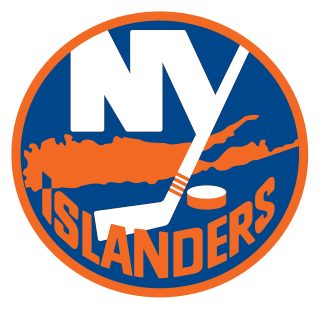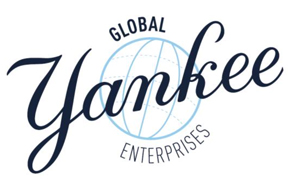Related Research Articles

The New York Islanders are a professional ice hockey team based in Elmont, New York. The Islanders compete in the National Hockey League (NHL) as a member of the Metropolitan Division in the Eastern Conference, and play their home games at UBS Arena. The Islanders are one of three NHL franchises in the New York metropolitan area, along with the New Jersey Devils and New York Rangers, and their fanbase resides primarily on Long Island.

The California Golden Seals were a professional ice hockey club that competed in the National Hockey League (NHL) from 1967 to 1976. Based in Oakland, California, they played their home games at the Oakland–Alameda County Coliseum Arena. The Seals were one of six teams added to the league as part of the 1967 NHL expansion. Initially named the California Seals, the team was renamed the Oakland Seals during the 1967–68 season and then the Bay Area Seals in 1970 before becoming the California Golden Seals the same year.

The National Hockey League commissioner is the highest-ranking executive officer in the National Hockey League (NHL). The position was created in 1993; Gary Bettman was named the first commissioner and remains the only person to fill the position to date. Among other duties, the commissioner leads collective bargaining negotiations on behalf of the league and appoints officials for all NHL games.

Patrick Michael LaFontaine is an American former ice hockey center who played in the National Hockey League (NHL) and spent his entire playing career with the league's New York State-based teams. He was inducted into the Hockey Hall of Fame in 2003.

The Charlottetown Islanders are a Canadian junior ice hockey team in the Quebec Maritimes Junior Hockey League (QMJHL) based in Charlottetown, Prince Edward Island. They are members of the Maritimes Division, and play their home games at the Eastlink Centre.
Gordon Gund is an American businessman and professional sports owner. He is the CEO of Gund Investment Corporation. He is the former co-owner of the San Jose Sharks from 1992 to 2002, former principal owner of the Cleveland Cavaliers from 1983 to 2005, and former principal owner of the Cleveland Rockers from 1997 to 2003. Gund lost his sight to retinitis pigmentosa and was a co-founder of Foundation Fighting Blindness.
Neil Smith is a Canadian ice hockey broadcaster, and previously the general manager of both the New York Rangers from 1989–2000 and (briefly) the New York Islanders in 2006. He was also the owner and head coach of the Johnstown Chiefs of the ECHL. He last was the president, general manager, and governor of the Greenville Road Warriors of the ECHL. He now is an on-air analyst for the NHL Network.

Yankee Global Enterprises, LLC, formerly YankeeNets, LLC, is an American limited liability company (LLC) which owns the New York Yankees baseball team, along with a plurality stake in YES Network and a 20% and 10% stake in New York City FC and AC Milan soccer clubs, respectively. It was formed in 1999 and is controlled by the family of George Steinbrenner. Other investors, including Lester Crown, Jerry Speyer, and Marvin Goldklang own minority stakes.

SportsChannel is the collective name for a former group of regional sports networks in the United States that was owned by Cablevision, which from 1988 until the group's demise, operated it as a joint venture with NBC.
John Angelo Spano Jr. is an American businessman and admitted fraudster. He is best known for briefly buying control of the New York Islanders franchise of the National Hockey League (NHL) in 1996, before it emerged that he had barely a fraction of the assets to buy the team; he used fraud to borrow enough money to initiate the purchase, believing he could use the fraudulently purchased team itself as the asset to then get the rest of the tens of millions of dollars needed to cover his fraud. He subsequently pleaded guilty to bank and wire fraud and served a federal prison sentence. Spano was convicted of 16 counts of forgery in Ohio in 2015 and is currently incarcerated in Grafton Correctional Institution with a scheduled release date of November 2024.

William Arthur Torrey was a Canadian hockey executive. He served as a general manager in the National Hockey League (NHL) for the Oakland Seals, New York Islanders, and Florida Panthers. He developed the Islanders into a dynasty that won four consecutive Stanley Cups. He was often called "The Architect", or "Bow Tie Bill" for the bow tie he wore.
MSG Sportsnet is an American regional sports network owned by Sphere Entertainment; it operates as a sister channel to MSG Network. The network serves the New York City metropolitan area, whose reach expands to cover the entire state of New York, Northern New Jersey, Southwestern Connecticut and Northeastern Pennsylvania; MSG Sportsnet carries sports events from several of the New York area's professional sports franchises, as well as college sports events.
The 1983 Stanley Cup Finals was the championship series of the National Hockey League's (NHL) 1982–83 season, and the culmination of the 1983 Stanley Cup playoffs. It was contested by the Campbell Conference champion Edmonton Oilers in their first-ever Finals appearance and the defending Wales Conference and Cup champion New York Islanders, in their fourth consecutive and overall Finals appearance. The Islanders swept the Oilers to win their fourth consecutive and overall Stanley Cup championship. The Islanders became the second team in NHL history to win the Stanley Cup four straight times, joining the Montreal Canadiens.
The 1979–80 New York Islanders season was the eighth season in the franchise's history. During the season, the Islanders dropped below the 100-point mark for the first time in five years, earning only 91 points.
The 1972–73 New York Islanders season was the first season in the franchise's history. At the beginning of 1972, Gordie Howe was offered the job as first head coach of the New York Islanders, but turned it down. The Islanders were coached by Phil Goyette (6–38–4) and Earl Ingarfield (6–22–2). Overall, the team finished in last place with an appalling 12–60–6 record, unable to qualify for the playoffs.
The 1991–92 New York Islanders season was the 20th season in the franchise's history. Denis Potvin's number 5 and Mike Bossy's number 22 were retired by the franchise.
Roy Lars Magnus Boe was an owner of the New Jersey Nets, New York Islanders, and several other professional sports teams.

The Phoenix Coyotes, a professional ice hockey team of the National Hockey League (NHL), and known as the Arizona Coyotes from 2014 until suspending operations in 2024, filed for bankruptcy in 2009 after incurring several hundred million dollars of losses since their move to Phoenix, Arizona from Winnipeg, Manitoba, where they were known as the Winnipeg Jets. A bankruptcy court rejected a plan to sell the team and move it to Canada, and the team was purchased by the NHL. The NHL operated the team in Phoenix for four seasons while seeking a new owner. After several prospective purchases fell through, the team was finally sold in the summer of 2013.
The history of the New York Islanders National Hockey League team dates back to 1972. Since 1980, the franchise has played in five Stanley Cup Finals, winning four straight Stanley Cups from 1980 to 1983.
References
- ↑ Anderson, Dave (May 26, 1980). "From Bankruptcy to the Stanley Cup". The New York Times.
- ↑ Hunter, Douglas (1997). Champions: The Illustrated History of Hockey's Greatest Dynasties. Chicago: Triumph Books. ISBN 1-57243-213-6.
- ↑ Rogers, Thomas (August 1, 1991). "LaFontaine to Islanders: No New Owner, No Pact". New York Times.
- ↑ Calabria, Pat (February 28, 1991). "Isles Boss Eyes Team In Miami". Newsday. Archived from the original on March 30, 2014.
- ↑ LaPointe, Joe (September 26, 1991). "2 Islander Standouts Still Demand Trades". New York Times.
- ↑ Thomas, Robert (December 11, 1991). "New Local Ownership Will Control Islanders". The New York Times.
- ↑ Yannis, Alex (August 18, 1992). "Cablevision Buys Islanders, and the Torrey Era Ends". The New York Times.
- ↑ "Contract Expires on Islanders Sale". The New York Times. July 21, 1993.
- 1 2 Mullen, Holly. Meltdown man. Dallas Observer, 1997-07-31.
- ↑ Fischler, Stan (1999). Cracked Ice: An Insider's Look at the NHL . Lincolnwood, Illinois. ISBN 1-57028-219-6.
{{cite book}}:|work=ignored (help)CS1 maint: location missing publisher (link)